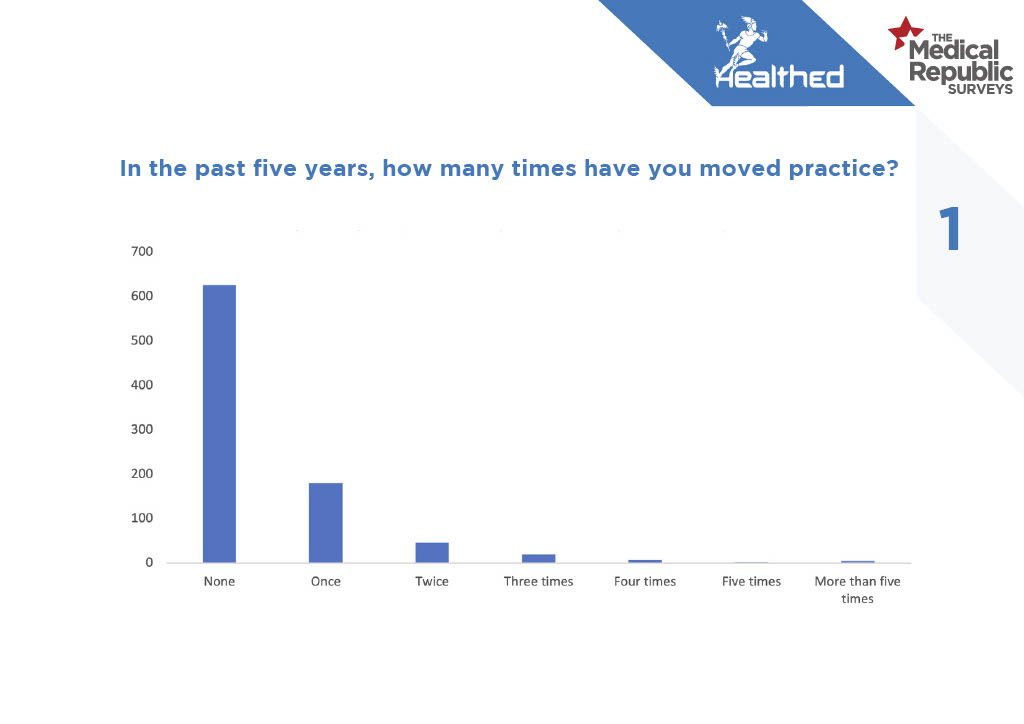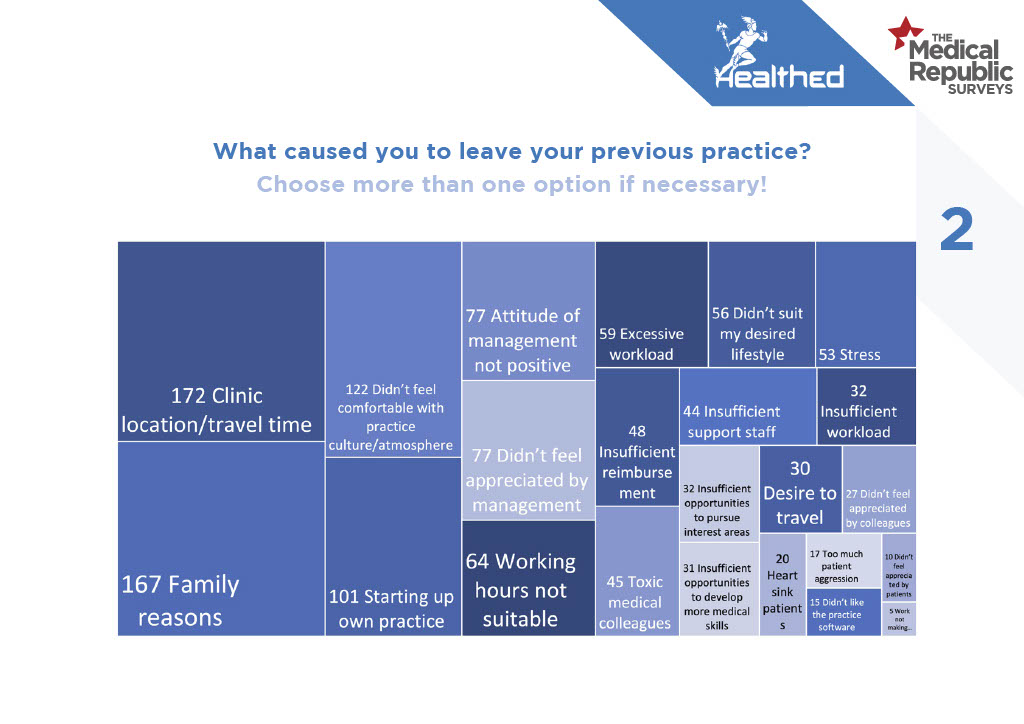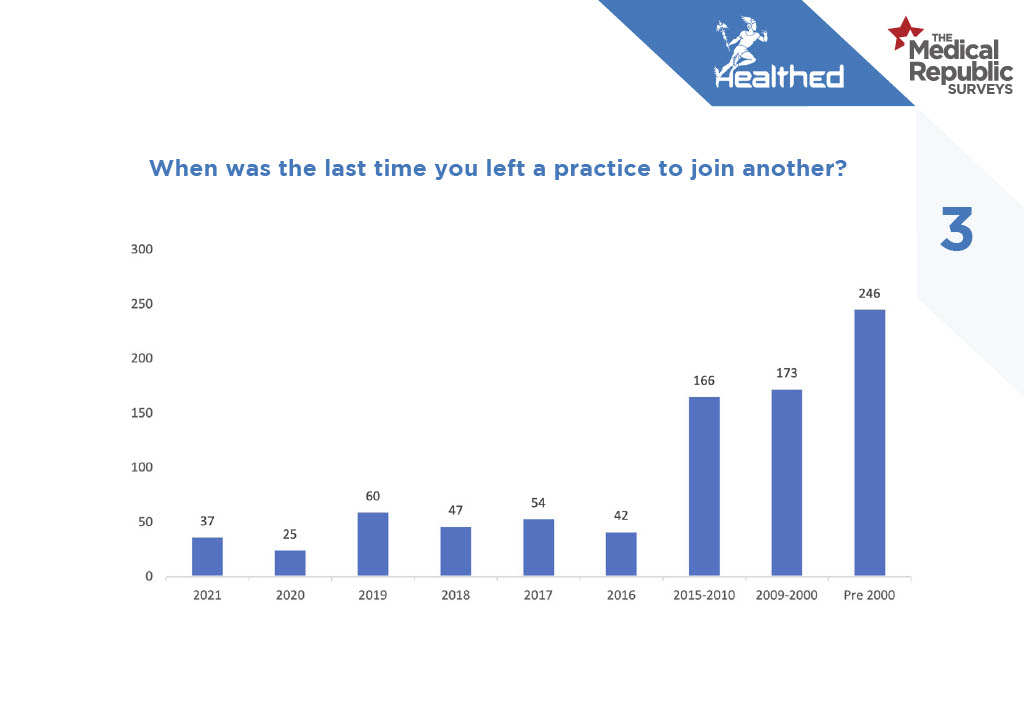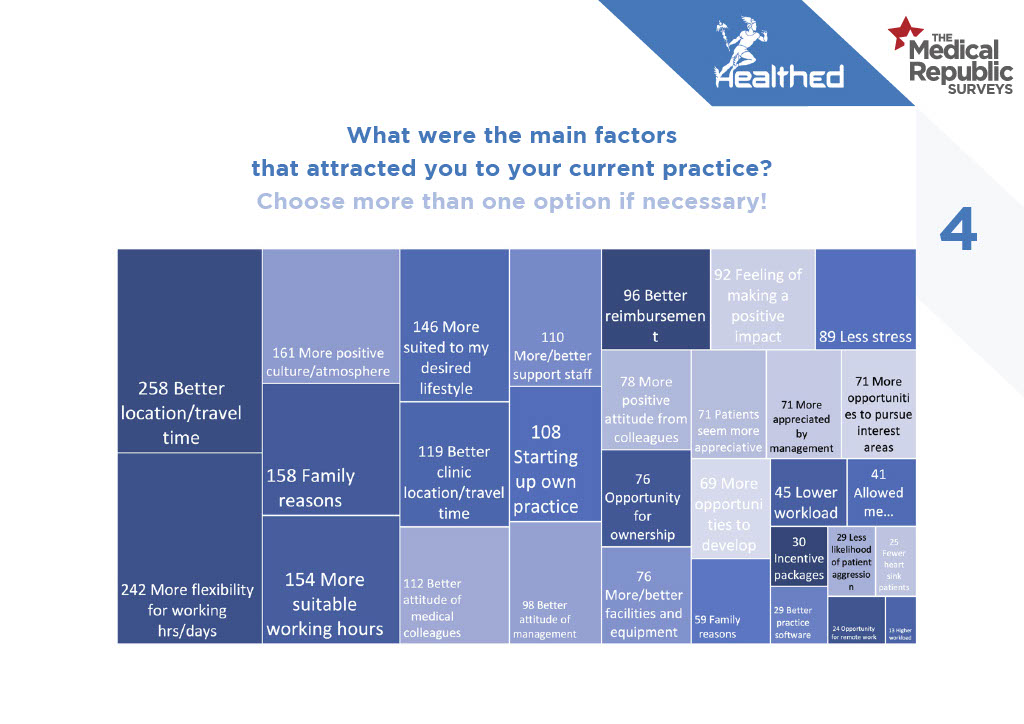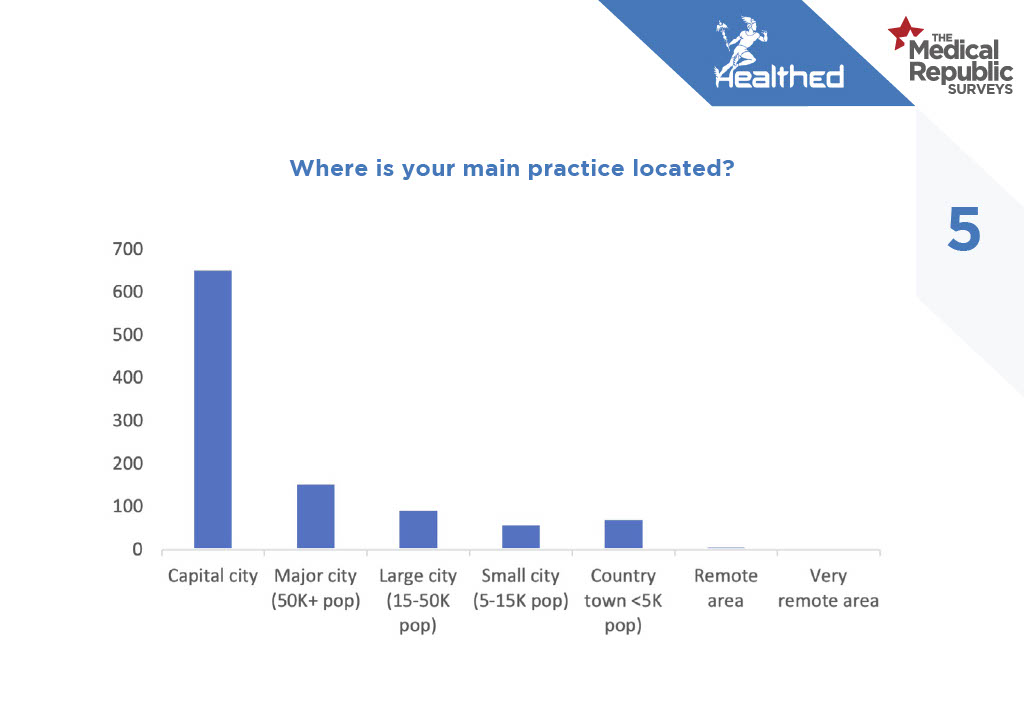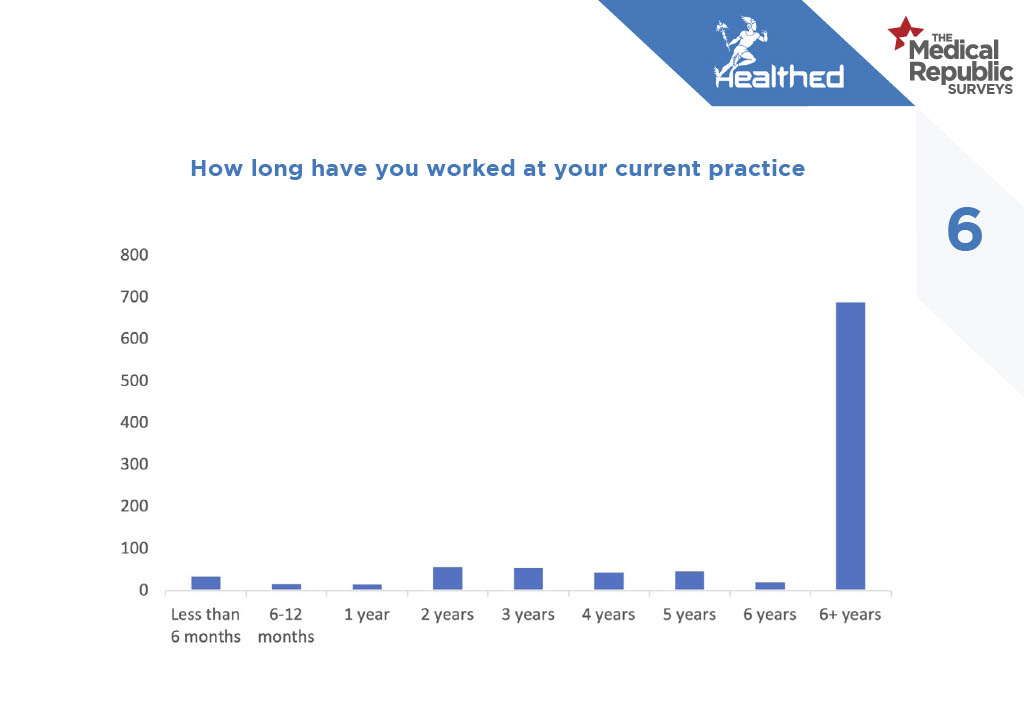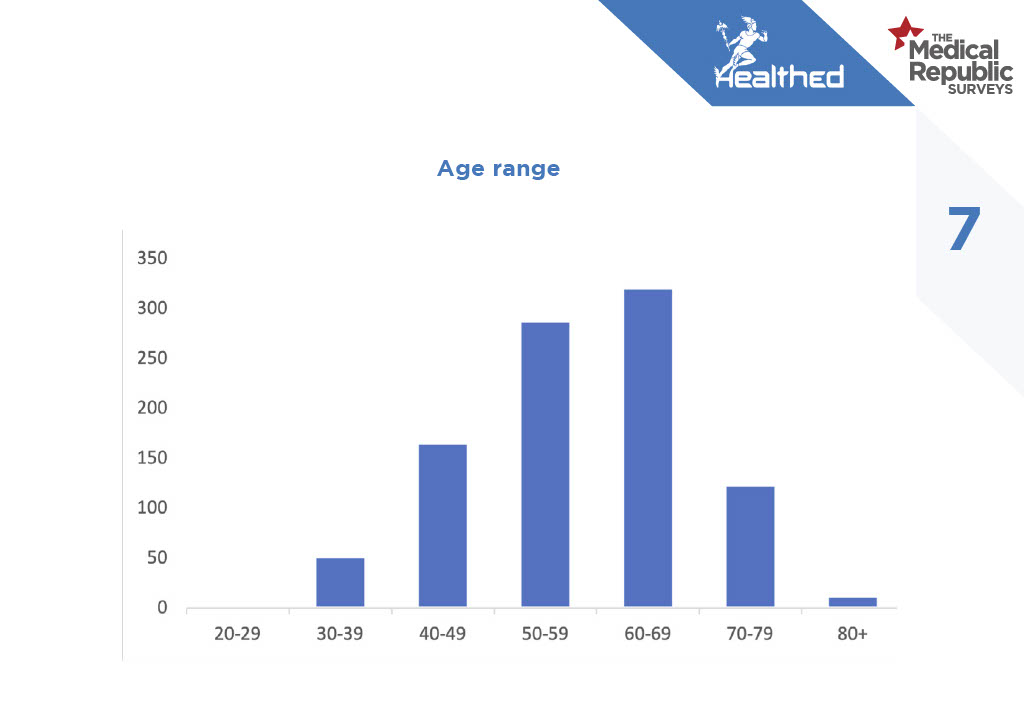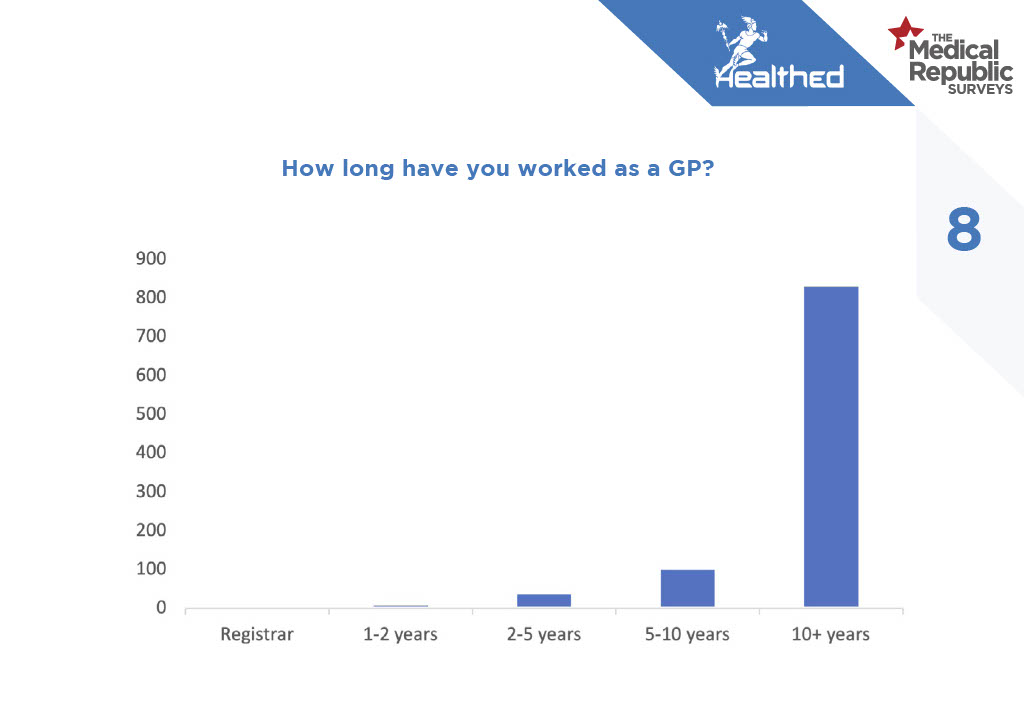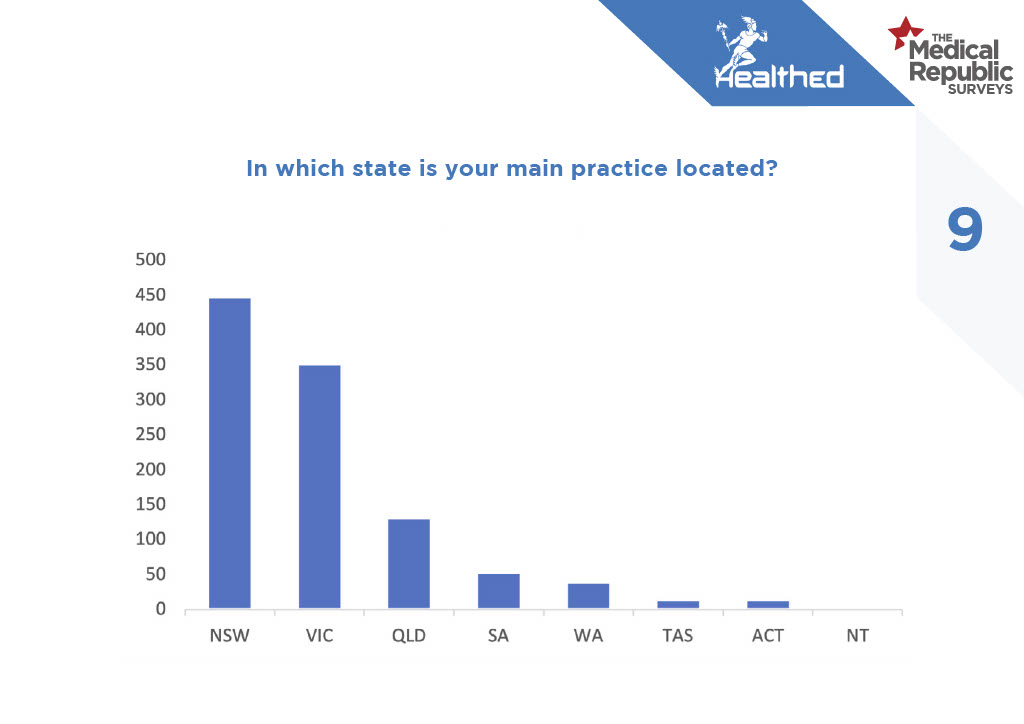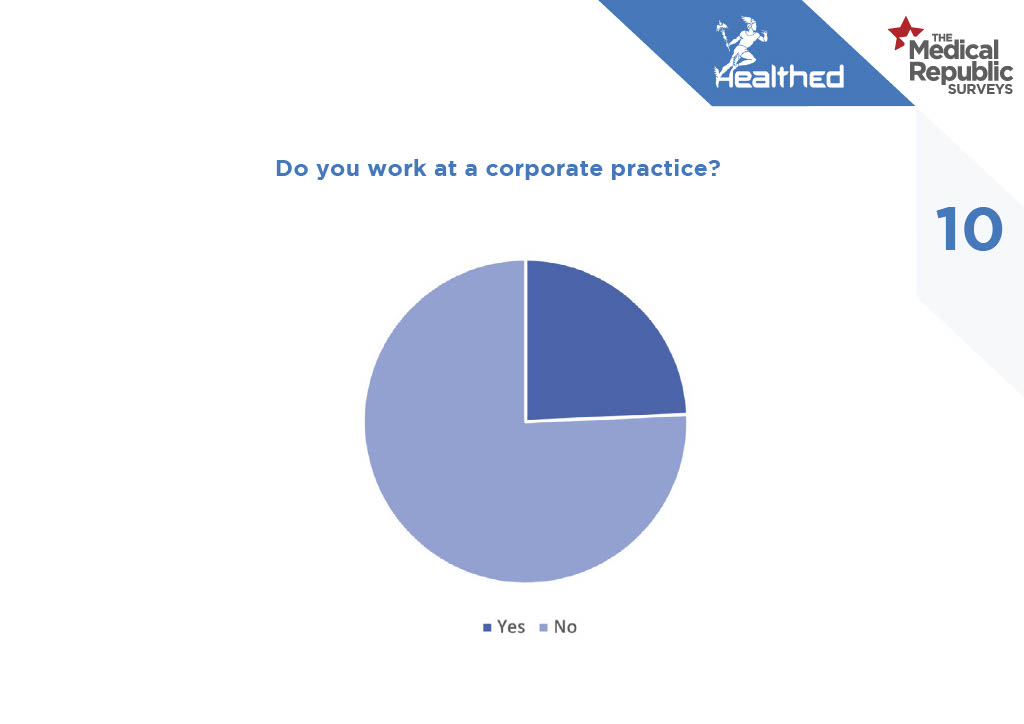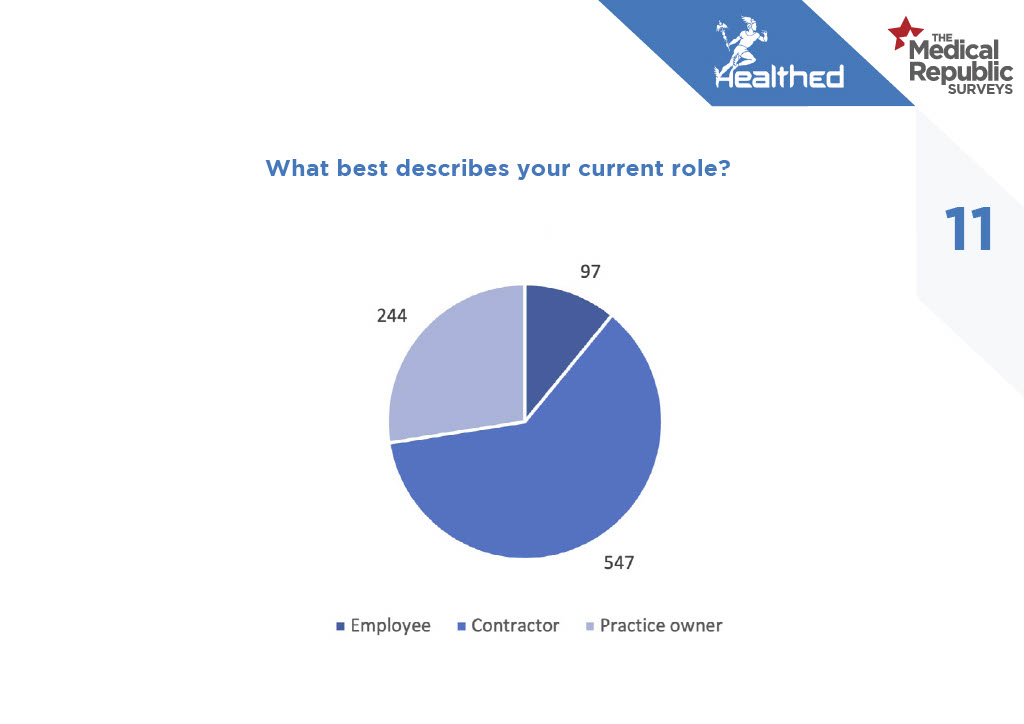A survey of around 850 GPs has revealed what’s really driving their decision to move practices.
Location and culture matter more than money when GPs make the decision to move practices, a survey of around 850 GPs suggests.
The survey was conducted by GP education company Healthed during a webcast on 17 August.
The survey included GPs mostly from capital cities around Australia who had worked at their current practice for more than six years, were aged over 50 and had more than ten years of experience working in general practice.
When asked, “What caused you to leave your previous practice?” the GPs surveyed were most likely to select “clinic location/travel time” (25%), followed by “family reasons” (24%), “didn’t feel comfortable with the practice culture/atmosphere” (18%) and starting up own practice (15%).
“Insufficient reimbursement” was selected as a push factor only 7% of the time by the GPs surveyed.
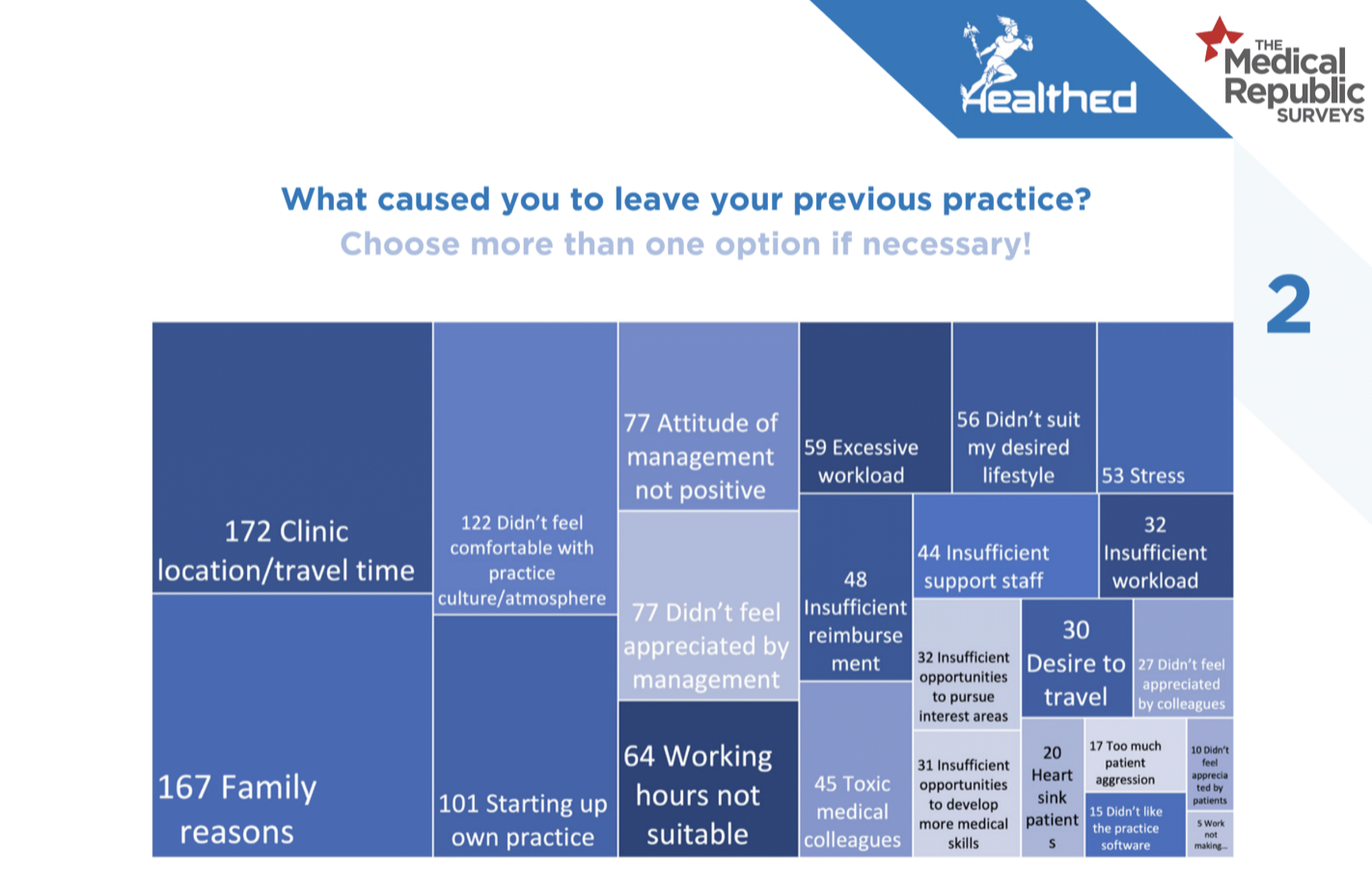
When asked “What were the main factors that attracted you to your current practice?” the GPs surveyed selected “better location/travel time” 32% of the time, “more flexibility for working hours” 30% of the time and more positive culture/atmosphere” around 20% of the time.
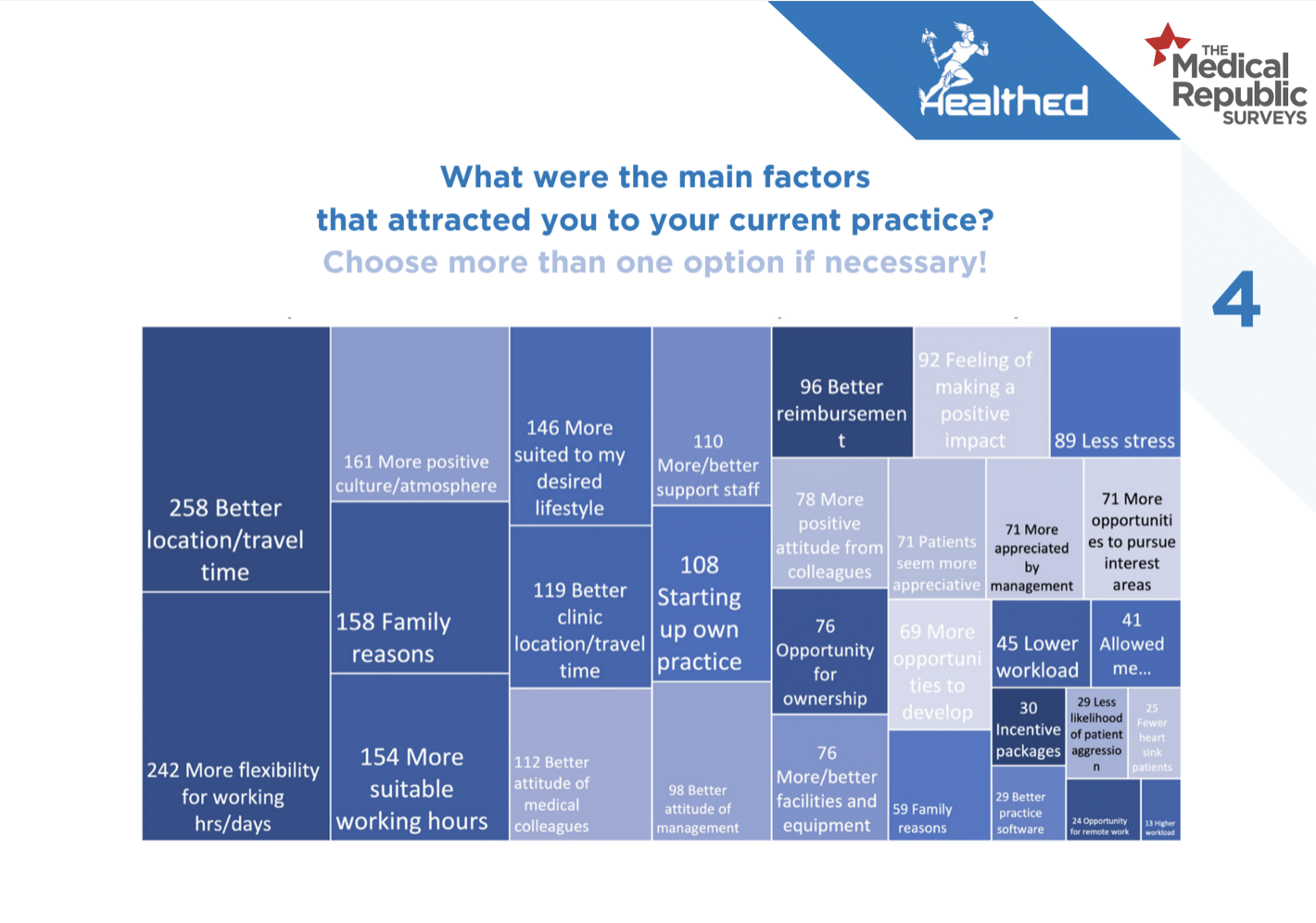
The GPs surveyed moved rarely; in the past five years, 70% did not move practices, 21% moved once, 5% moved twice and around 3% moved three times or more.
Only 5% of GPs jumped practices in 2021, and even fewer made a change in 2020 – just 3%. The last time most GPs moved practices was before 2016.
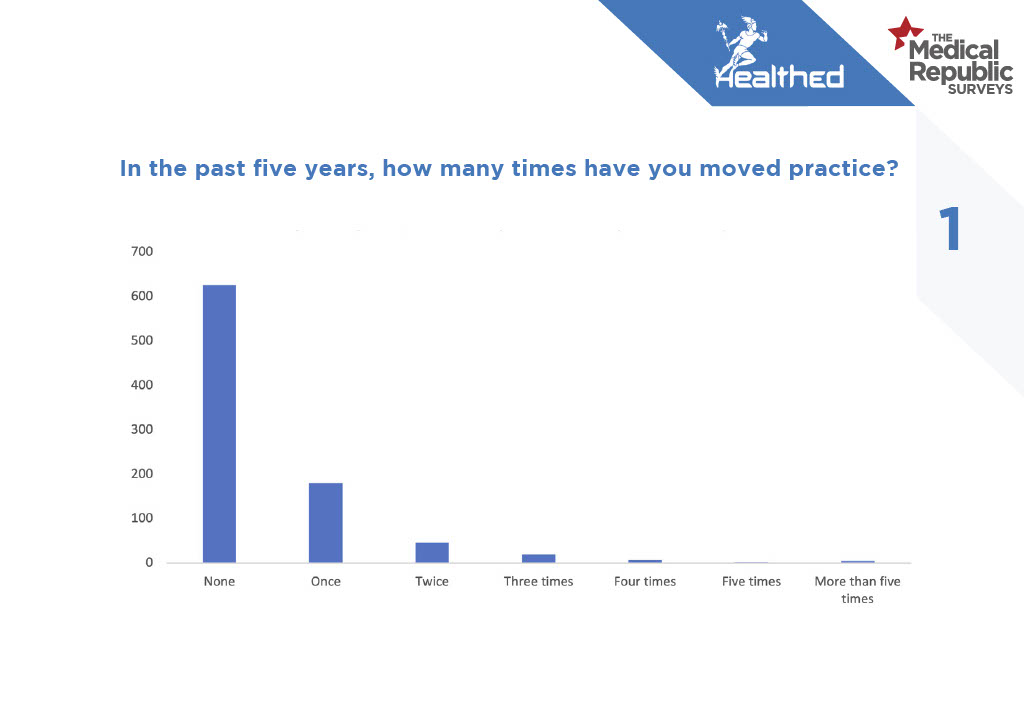
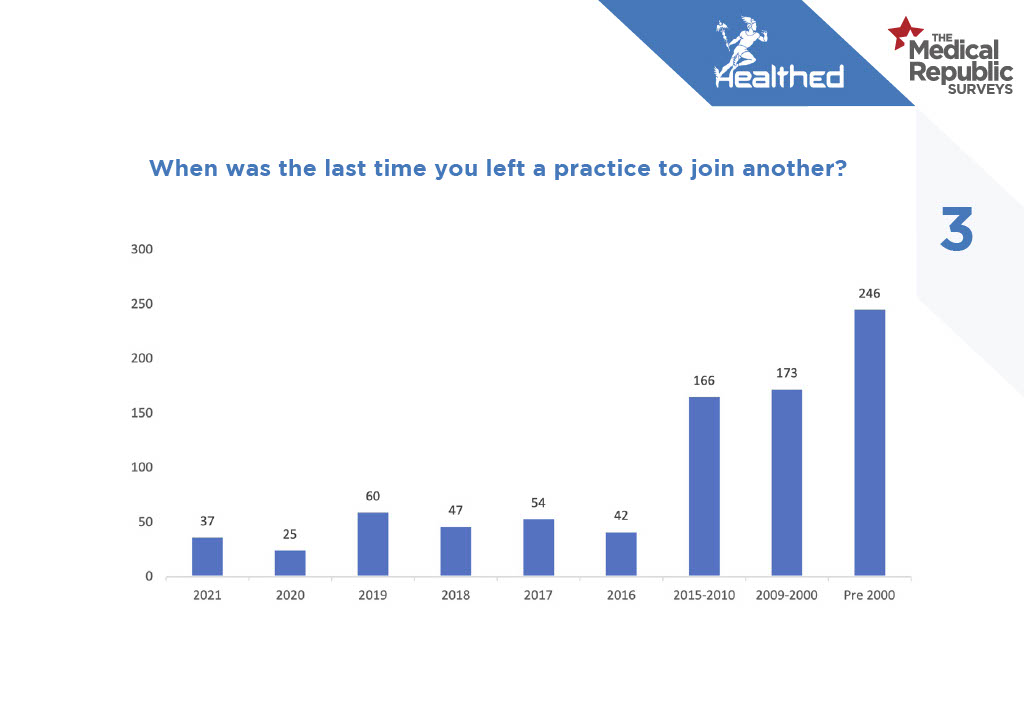
GP recruiters told The Medical Republic the survey results reflected the general trends they saw in the industry.
“Obviously, GPs – and I think anyone – needs a stable income,” said James Hall, a talent resource manager at Healius Medical & Dental Centres. “But financial incentives are not typically the largest reason why we see doctors join us or depart a network.
“Reasons I see include: wanting to work in a well-run practice with great nursing support so they can focus on medicine, not admin, wanting to try mixed billing and appointments instead of bulk bill walk-ins, etc.”
Location is really important to GPs, either because the GP is an international medical graduate who is required to work in a particular area, or because GPs, like many other professionals, are attracted to ‘nice’ suburbs in urban areas with good schools and easy access to friends and family, he said.
The fact that most GPs surveyed had not moved practices recently was not surprising. “It’s a candidate short market – so as a practice you need to stand out” said Mr. Hall.
GP practices are more competitive in terms of recruitment if they invest in support services that make it easy for GP contractors to run their business – such as good practice software, on-site pathology, and highly skilled nurses, he said.
The survey showed that GPs moved less in 2020 than in previous years, which was reflected in what recruiters witnessed through the pandemic.
“The pandemic had an impact short term as people are craving certainty,” said Mr. Hall. “The movement has been somewhat reduced.”
“But I do see, as the market opens up, some really strong years in recruitment ahead. I think it’s got a lot of people looking at next year and beyond, and probably wanting a change. I think we’re going to see a lot of Interstate moves – practices willing to support GPs considering this will do well.”
“This data collected is pretty much spot on,” said Api Yuganathan, a recruitment partner at Healthcarelink. “The top two reasons why GPs look to change their jobs would be to reduce travel time and family commitments.”
Ms Yuganathan said GPs often didn’t cite toxic practice culture as a reason for leaving a workplace, possibly due to confidentiality or not wanting to come across as someone who speaks unprofessionally about the current workplace.
“Or it may come across as a bit of a stigma of someone being ‘difficult’ – whatever the reason, it’s not commonly voiced out loud,” she said.
“So, it’s quite interesting to see the numbers that amount to these factors. Workplace culture is key to retention. The practices that invest time and money into their culture ensuring inclusivity, recognition and teamwork would see a higher retention rate.”
Ms Yuganathan said “the current market is starved of health practitioners and, as in any market where there’s high demand, how the candidate sees you is paramount.”
“More and more first impressions are now formed online. Hence, it’s super critical to have a well-structured, comprehensive and clear practice website and social media channels.
“When you are looking at advertising your role, you need to step away from generic job boards and career sites and try to work in partnership with healthcare-specific job boards where the target audience and members are professionals within the industry.
“Secondly, within the advertisement your practice culture should shine through to attract like-minded long term GPs to join your team.
“The reason for the hire is also really important to the reader. They need to understand and picture the situation that they would be commencing under. Is it a retiring GP you are looking to backfill? Or has the practice expanded its premises and is looking to bring on additional GPs due to space?”
See the full survey results below (or in higher resolution here).
Brayden Ball, the senior recruitment consultant for general practice at HPG, said the survey mostly focused on GPs aged over 50 who were less likely to move than younger GPs.
“Many of the doctors we work with are between 35-50 and seeking further clinical development, so very willing to move for the right opportunities,” he said.
“Whilst the GP market is widely considered as ‘passive’, our experience is that is it a ‘quietly active’ market. Doctors who engage in conversations often aren’t aware of the real benefits of new opportunities. Further conversations unfold and they fast become ‘active’ candidates.”
The key to recruitment success as a general practice, according to Mr Ball, was to present the clinic in an open and transparent manner, highlighting the potential revenue, patient numbers, clinical support and why the doctor would be successful in their clinic.
“Secondly, provide examples of workplace culture and allow potential candidates to engage with members of your team to see how their personality and work style will complement your clinic,” he said.
“This is particularly relevant as the data suggests a GP will seek a new clinic due to culture, flexibility and lifestyle reasons.
“Interview preparation for both parties is something we work hard on with them because it is so important to make the most of the opportunity to assess if the fit is right.
“The first thing GPs mention during interview feedback is the nature and style of conversation and whether the person they met with was friendly and engaging, so first impressions really are important.”
Max Drakeley, a recruitment partner at Prescript Recruitment, said the survey confirmed the relatively small percentage of GPs moving due to reimbursement compared to lifestyle factors.
“This confirms to me that, although GPs are generally underpaid compared with specialists in other fields, that the reimbursement is pretty standard across GP practices Australia wide, and therefore is not in the top 10 reasons GPs move to other practices,” he said.
“Interesting also to see nearly a quarter of respondents factor in flexible working hours/days that attracted them to current practices. Particularly over the last 18 months we’ve seen GPs wanting to take a step back from full-time work in a local practice, either to spend more time with family, have the opportunity to pursue other work or training (locum work or skin, sexual health, cosmetic, women’s health, palliative care training) or simply to avoid burnout during a very challenging time for general practice.”
“I think these two points are really important for us as recruiters to emphasise this to practices looking to attract GPs – that there’s signs of a transition from ‘old school’ GPs who are happy to work long hours and weekend shifts in order to bill as much as possible, to a more modern cohort who prioritise family commitments or the flexibility to pursue options outside of general practice.
“Clinics offering job share or part-time arrangements are going to be more successful.”



